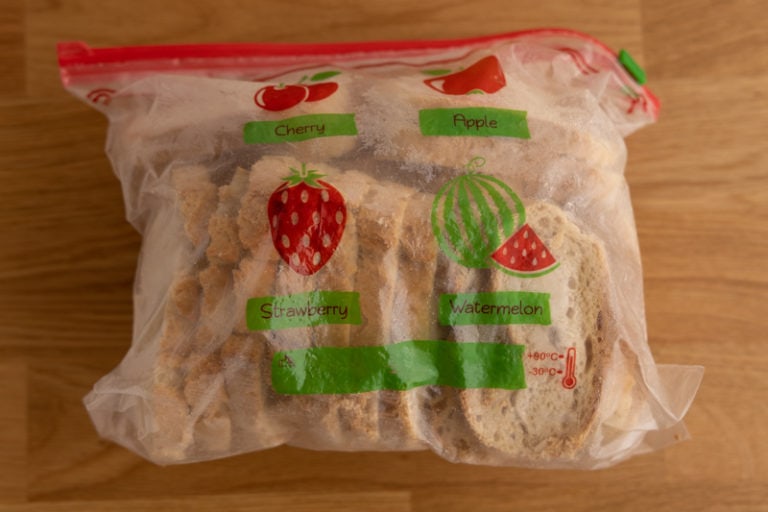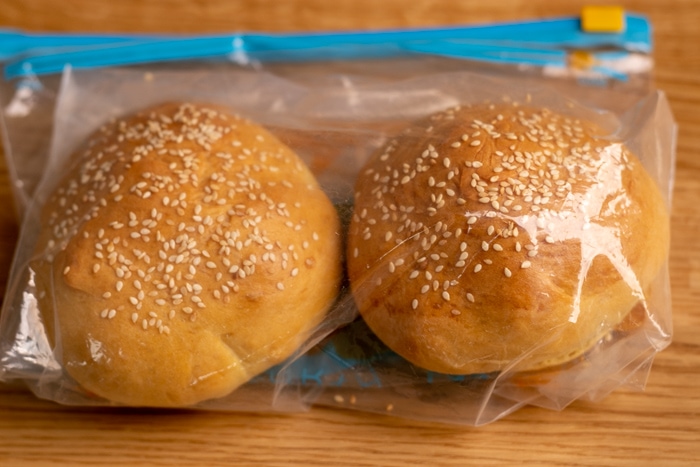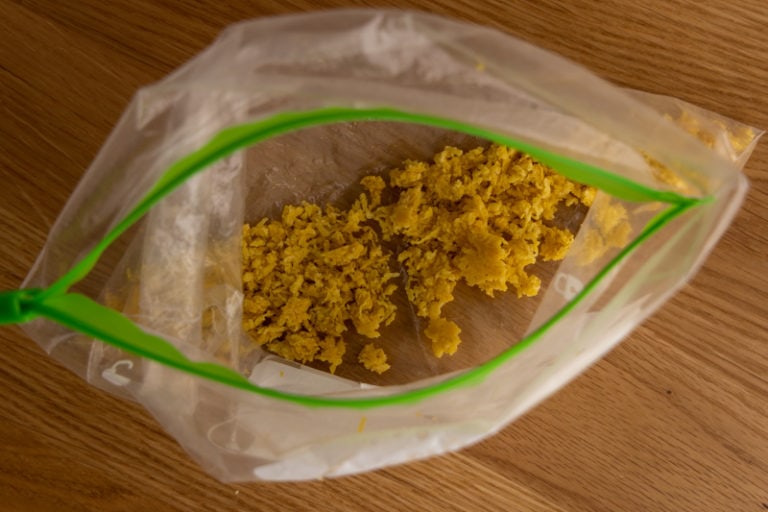How to Store Muffins to Keep Them Fresh?
You just baked a big batch of muffins and you’re wondering what’s the best way to store them so that they stay fresh and moist.
So, how do you store muffins?
After your muffins cool completely, place them in an airtight container or freezer bag and store them on the counter for 3 to 4 days. If they’re quite moist, consider lining the container or bag with paper towels to catch extra moisture.
Those are the basics that work for most muffins out there, but you might need to change things up a bit depending on your recipe and circumstances.
Interested in learning more? Here’s what we’re going to discuss below:
- whether removing the muffins from silicone or paper liners is that important
- when you should refrigerate muffins
- if using paper towels is necessary
Read on.

Let Them Cool Before Storage
Letting the muffins sit on a wire rack for half an hour allows them to release any extra moisture that’s inside. So before you even think about transferring your freshly-baked muffins into a container or bag, make sure they are completely cool.
If you skip that step, all that moisture will remain inside the muffins, gradually move towards the surface, and you will end up with a wet or soggy base. Nobody wants that to happen.
And if you don’t have a wire rack, just place the muffins in a single layer on a plate making sure they’re not crowded. The results are about the same.
Now, you might have read that you should remove your muffins from any paper or silicone liners you might be using. That’s supposed to allow the baked goods to release steam and cool better.
The theory makes sense, but from my experience, following this advice doesn’t help all that much. There’s still quite a lot of uncovered surface area that allows the moisture to escape.
Of course, I’m not saying that you shouldn’t remove your muffins from liners after baking. I’m just pointing out it might not change all that much.
If you’d rather leave your muffins in their liners, I suggest you run a simple test. First, remove the liners from half of the muffins and leave the rest as-is. Then you compare how both types hold up after a day or two.
If one type tastes better than the other, you have a clear winner.

How To Keep Muffins Fresh and Moist?
The best way to keep your muffins fresh and moist is to keep them in a sealed airtight container or freezer bag. Either ensure the muffins retain their moisture and don’t dry out too quickly.
The issue with small and sealed spaces is that any extra moisture that’s there has no way of escaping. And if that moisture happens to be inside your muffins, it will move towards the surface and accumulate there because it has nowhere else to go. That’s how you end up with soggy muffins after a couple of days of storage.
The solution is lining the container with a paper towel or two and topping the muffins with another pair. Those paper towels will absorb that extra moisture leaving your muffins moist but not wet.
Related: How long do muffins last?
Does that mean that you should always use paper towels when storing muffins? Not necessarily.
What I found is that only really moist muffins tend to have sogginess issues. I’m talking about those with lots of fresh fruit and, therefore, water content. For those, paper towels should be quite helpful.
But for others, those paper towels probably won’t make that much of a difference.
The bottom line is that if your muffins become soggy after a couple of days of storage, making sure they cool thoroughly and lining the container with paper towels should help. Otherwise, don’t fix it if it ain’t broken.

Should You Refrigerate Muffins?
While many articles out there claim that you should never refrigerate muffins, that’s not necessarily the case. Sure, most recipes store just fine on the counter for a couple of days, but in certain cases, refrigeration is definitely worth considering.
One such case is that if you’re using unmashed fresh fruit in your recipe. That means most blueberry, raspberry, and other fruit-based muffins out there.
I don’t know about you, but I wouldn’t feel comfortable leaving muffins topped with fresh fruit on the counter for more than a day or two. If you want to store them for longer, you should refrigerate them.
And in case you were wondering, I’m not the only person recommending this. Kate from Cookie & Kate blog recommends refrigerating her blueberry muffins if you need more than 2 days of storage.
Besides muffins topped with fresh fruit, I also recommend refrigerating almost any type of savory muffins. That category includes muffins with cheese (or other dairy products), ham, sausage, and the like.
Now, let’s discuss the last possible way to store muffins – the freezer.

Can You Freeze Muffins?
Most muffins freeze surprisingly well, and freezing them takes little time and effort. All you need is a couple of freezer bags or plastic containers and some free space in the freezer.
To freeze your muffins, do the following:
- Let them cool. If your kitchen still smells like just-baked muffins, it’s probably too soon. Make sure those muffins are room temperature both outside and inside.
- Place them in containers or bags. If your muffins are moist on the outside, or sticky, consider freezing them individually so that they don’t stick. For regular muffins, you can freeze as many as you like in a single bag or container. If you’re using a bag, squeeze out as much air as possible before sealing it.
- Chuck everything in the freezer.
One thing worth noting is that if you’re expecting the muffins to sit in the freezer for a prolonged period, like a month or more, it’s better to go with a bag. That’s because they don’t allow nearly as much cold air near the muffins as containers do.
It’s best to freeze muffins in a single layer so that none of them get crushed. Also, if you’re afraid other food products might squash them, go with a container or place that bag in one.
How long can you freeze muffins for, you ask? 3+ months is a pretty safe bet and should be enough for most of us.
But if the muffins sit in the freezer for longer, thaw them and assess the quality before serving them. Chances are they’ll be quite alright.
Speaking of defrosting, leave your frozen muffins on the counter until they get to room temperature. That might take between an hour to maybe three hours, depending on the size and what’s inside (the more moisture inside, the longer they thaw).
Once your muffins defrost, make sure to eat them the same day.

Rotten Records: Share Your Snap!
Caught some food past its prime? Upload your photo to “Rotten Records” and help others spot the signs of spoilage. Every image makes our food community safer and more informed!





